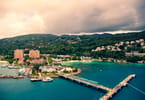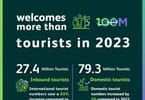From the airlines and cruise ships to the hotel components of tourism, profits have for many decreased and the word “bankruptcy” is heard with ever more frequency. Although the summer of 2022 was a banner year for tourism, it would be a mistake to believe that COVID has not made many people afraid to travel. Although it appears that we have left the crisis of 2020-2021 behind, new problems and the use of virtual conferences might well put a dent into the business travel market. Europe is in an especially dangerous situation and the winter of 2022-2023 may be a very cold winter both in-doors and out of doors.
Besides the major plague of COVID, the سفر ۽ سياحت industries have suffered from numerous other plagues including the plague of terror, of crime, of high gasoline prices, of war, of inflation, of political instability, and of supply and worker shortages. Crises often have three stages: (1) the pre-crisis stage when we develop crisis scenarios for the “just in case,” (2) the actual crisis, and (3) the recovery from the crisis stage. If the third part of the crisis, the post-crisis stage is not handled correctly then it becomes a crisis in and of itself.
Historically however, after each crisis those components of the tourism industry that have survived the crisis have found ways to recover. This month’s “Tourism Tidbits” looks beyond the multiple crises to the recovery stage.
While each crisis has its own uniqueness, there are general principles that apply to all tourism crises recovery plans.
Here are a few ideas for your consideration.
-Never assume that a crisis will not touch you. COVID has taught all of us that no one is immune from a tourism crisis. Perhaps the most important part of a crisis recovery plan is to have one in place prior to a crisis. While we can never predict the exact nature of a crisis before it occurs, flexible plans allow for a recovery starting point. The worst scenario is to realize that one is in the midst of a crisis and that there are no plans to deal with it.
-Remember that the further one is from the crisis the worse it appears. No one has to visit your community and once the media begins to report that there is a crisis, visitors may quickly panic and begin to cancel trips to your locale. Often it is the media that define a crisis as a crisis. Have a plan in place so that correct information can be given to the media as quickly as possible.
-Recovery programs can never be based on one factor alone. The best recovery programs consider a series of coordinated steps all working together. Never depend on only one remedy to bring you toward recovery. Instead coordinate your advertising and marketing campaign with your incentive program and with an improvement in service.
-Never forget that during crisis geographic confusion often occurs. For example, if the media report that there are forest fires in a particular part of a state or province, the public may assume that the whole state (province) is on fire. Visitors are notoriously bad at realizing the geographic limits of a crisis. Instead, panic and geographic confusion often expand crises and make them worse than their reality.
-Make sure that you let people know that your community is not closed for business. After a crisis it is essential that the message be sent that your community is alive and well. Encourage people to come by creative advertising, good service and incentives. The key here is not to worry about the size of a discount but rather to get the flow of people back to your community.
-Encourage people to support your community by visiting it. Make a visit to your community in the post-crisis phase an act of community, state, or national loyalty. Let people know how much you appreciate their business, give away special souvenirs and honors to those who come.
-Emphasize the need for tourism employees to maintain both dignity and good service. The last thing a person on vacation wants to hear is how bad business is. Instead, emphasize the positive. You are pleased that the visitor has come to your community and that you want to make the trip as enjoyable as possible. After a crisis now frown but smile!
-Invite magazines and other media people to write articles about your recovery. Make sure that you provide these people with accurate and up-to-date information. Often them the opportunity to meet with local officials and provide them with tours of the community. Then seek ways to gain exposure for the local tourism community. Go on television, do radio pieces, invite the media to interview you as often as it likes. When speaking with the media, in a post-crisis situation, always be positive, upbeat, and polite.
-Be creative in developing programs that encourage the local population to enjoy its community. Immediately after a crisis, it is essential to shore up the economic foundation of the local tourism industry. For example, restaurants that had depended on tourism income may find themselves in a desperate situation. To help these people over the crisis’ hump, develop creative programs that will encourage the local population to enjoy its hometown. For example, in the case of local restaurants, develop a dine-around program or a “be a tourist in one’s own backyard” program.
-Find industries that may be willing to partner with you so as to encourage people to return. You may be able to speak to the hotel industry, transportation industry or meetings and convention industry to create incentive programs that will help your community ease through the post-crisis period. For example, the airline industry may be willing to work with you to create special fares that encourage people to return to your community.
-Do not just throw money at a crisis. Often people deal with crises simply by spending money especially on equipment. Good equipment has its role, but equipment without the human touch will only lead to another crisis. Never forget that people solve crises and not machines.
ليکڪ، ڊاڪٽر پيٽر اي ٽارلو، صدر ۽ گڏيل باني آهي World Tourism Network ۽ اڳواڻي ڪري ٿو محفوظ سياحت پروگرام.























